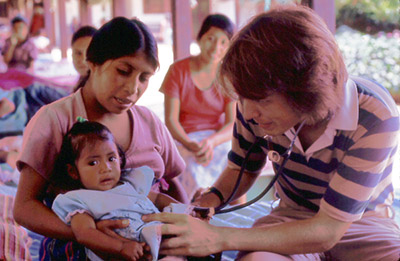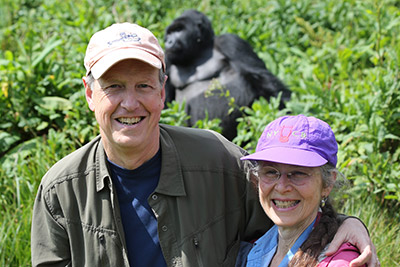One of Jeffrey Harris's epiphanies came when he was a floppy-haired, fourth-year medical student. It was 1977 and he was in Guatemala, working at a rural hospital. Five children had died from measles and malnutrition – deaths, he realized, that would not have occurred in the United States because of routine vaccinations.

"It just didn't need to be," Harris said. "Ever since then, I've been a prevention guy."
Harris went on to work for the Centers for Disease Control and Prevention, first as a "disease detective" and later as a policy director. He also spent two years in Bangladesh overseeing a massive cholera vaccine trial and served as the first AIDS coordinator for the U.S. Agency for International Development, a program that reached 70 countries. More recently, he has led the UW’s CDC-funded Health Promotion Research Center.
On Aug. 1, Harris assumed the role of chair of Health Services, one of five departments within the University of Washington School of Public Health. He will lead a team of about 60 core faculty while overseeing eight main degree programs, four research centers, and a $20 million budget. About 400 students are enrolled in the department at any given time.
"We are a very broad department," Harris said during a recent talk. "That means we can tackle just about anything."
At the top of opportunities he sees is researching the impact of the Affordable Care Act. "It's the biggest change in health care in 50 years," Harris said. "We're going to get very close in a state like Washington to insuring 90 to 95 percent of people."
The challenge, he said, is figuring out whether people are really getting access to health care and if they are using it effectively. That's a big deal, according to Harris. An estimated 18,000 people die each year in the United States because they lack insurance or don't have enough of it.

Harris recalled treating a Mexican immigrant with a parasitic brain infection. After he was released, the hospital went after him "with both barrels" for payment, garnishing the man's wages. "The injustice of that has never left me, and it has made me a lifelong advocate for universal health insurance and for fairness," Harris said.
The new chair also cited the ongoing move by many organizations to move away from a fee-for-service model to one that's driven by value – providing the care people need at the lowest cost. The department can evaluate those incentives, which are part of health care reforms linked to the Affordable Care Act.
"Serving partners" to improve health and health care is a key mission of the department, Harris said. Those partners fall into three categories: health-care organizations, state and local public health agencies, and community-based organizations such as the American Cancer Society and Asian Counseling Referral Services. "I want partners to think that we are indispensable to them," he said.
Harris also cited tremendous opportunities to improve the health of Latinos. They will double in number to about 106 million by 2050, according to the U.S. Census Bureau. Many Latinos face health disparities driven by barriers ranging from language to legal status, he noted.
Another demographic on the rise is people over the age of 85. "A fall for an older adult can be a death sentence," Harris said. "What are we doing to help those people cope and live independently and happily for as long as they can?"
Other opportunities include improving mental health, addressing chronic disease management and promoting health in the workplace. "There’s no place that more people go every day outside of their homes than the workplace," he said. "So it's a good place to promote healthy lifestyles like physical activity."

The new chair said he is gathering input to determine priorities for the department, but his own objectives include increasing the diversity of faculty and students, and financial sustainability for the department. Private donors could help with matching funds to recruit and retain top students and faculty, particularly from underrepresented groups.
The son of a physician, Harris appeared on the Bozo the Clown TV show when he was three years old to announce he was going to be a pediatrician. He is married to Judith Wasserheit, chair of the Department of Global Health, which is housed in the Schools of Public Health and Medicine. The two met while medical interns at Columbia University.
Harris said he didn't foresee any conflicts with his spouse as a fellow chair. "Your highest professional priority is for your department," he said. "I think for both of us, we realize it's also really important to support the School and to support the university, and to balance all that." It requires being transparent and discreet, he added.
When he's not working, Harris likes to kayak, ski, swim, take photographs and walk. He takes Spanish classes at Casa Latina, trying to regain the fluency he once had as a youth. He and Wasserheit are also committed to doing their part to affect climate change. They both drive electric cars and have managed to reduce their household energy consumption by about 70 percent over the last 13 years.
